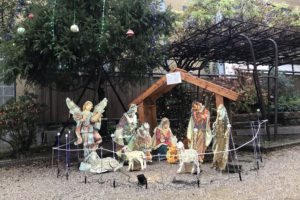Proper 20, September 18,2022
Amos 8:4-7, 1 Timothy 2:1-7, Luke 16:1-13
Julian Whitney
Marx and Engels are oft’, in my opinion, misunderstood in their writing; “Religion is the Opium of the masses.” Marx and Engels saw how the aristocracy and the nouveau riche cited, used, scripture, The Bible, for their own purposes to suppress, to control, the proletariat, working people, and steal from them their fare share of the industrial revolution.
There was once such proletariat, a working man, a simple carpenter’s son from Palestine. He stood up, protested against the rich and self-righteous, who flaunted their wealth and reaped the harvest of their lands, even unto to the very edges of their fields and gathered the gleanings of their harvest, so that they may bestow their ‘charity’ upon the poor.
Was this really charity? They used wage-slave labour to harvest their crops, every single grain, even the gleanings – the small remains of their crop, at the edges of the field, which the poor workers used to collect at the end of the day in order to make bread in order to feed their families.
Yet there were no gleanings, the remains of the harvest that they had worked so hard to pick for their rich masters. They could not collect gleanings in order to make bread for their families. Thee poor, wage-slaves, couldn’t feed their families as the wealthy land-owners had taken EVERYTHING – 100% of the harvest.
Later, once the wealthy land-owners had increased their wealth by selling the best grain, they would give their not-so-good grain, what they couldn’t sell for profit, to the poor. This they believed was ‘charity.’
Can you hear Jesus’ weeping? Can you feel his tears upon your cheek? Would you turn the other cheek so that he might cry once more upon you again? He died for our sins, yet this sick world repays him with avarice, with greed; wanting more than what is sufficient, and the rich let the rest of God’s children languish in poverty, sickness, and ultimately an untimely death.
Amos critics their words and implies the intentions of those hypocrites:
-“Hear this, you who trample the needy and do away with the poor of the land,” OPPRESSIVE!
-“When will the New Moon be over that we may sell grain, and the Sabbath be ended that we may market wheat?” GREEDY!
-“…skimping on the measure, boosting the price and cheating with dishonest scales,” CHEATING!
-“Buying the poor with silver and the needy for a pair of sandals…” SLAVE-TRADING!
Doesn’t that sound rather like the Mafia, the Yakuza, the Oligarchs, the Military-Industrial Complex, Big-Pharm., the Energy Companies; the ultra-rich: 1% of God’s children who manipulate and control the bounty of this mess of God’s gift which he bestowed upon all of his children?
But God remembers these transgressions, “The Lord has sworn by himself, the Pride of Jacob: “I will never forget anything they have done.”
Timothy urges, encourages, us that supplications, prayers, intercessions, and thanksgivings be made for everyone.
A supplication is a specific request – “God, the Father, bless this congregation, each and every one, at Christ Church, Nara.”
A prayer is either place of prayer (in ancient Greek), or a more general request- “God, please bless us, so that we, in turn, may bless others with kindness.”
An intercession is an urgent request – “Heavenly Father, protect and provide for all those suffering in the Ukraine.”
A thanksgiving is a prayer of gratitude – “Father, we thank you for this year’s bountiful harvest.”
Personally I prefer to pray the other way around; first I thank God for someone, or something and THEN make a request regarding that person or thing so as not to make my prayers like a shopping list, a wedding-gift list, or a Christmas list – THAT would begin, “Dear Santa, ~”!
In my opinion, within the context of today’s readings, Timothy specifies that all, EVERYONE – from Kings to Gentiles, have their own reason for give thanks, and their own reasons to ask for help, from each according to her or his own ability, and to each according to her or his own need.
And Luke? My word! Riddle me this, riddle me that! Jesus at his most juxtaposed! I don’t know how much has been lost in translation. Jesus probably spoke Aramaic, someone spoke of this parable to someone who then told Luke and then he, or a transcriber wrote it in Ancient Greek which was then translated into English. Grammatically it is difficult to understand;
I think the charges were brought to the manager. The rich mens’ fortunes were scattered, they were redistributed by the deceitful manager. The fortunes of the rich are “dieskorpierson” = redistributed. The manager does not repent, he does not say, “Sorry😢”, but he cheats the owner of the property. Yet as a result of his dishonesty the poor’s debt was reduced. So was the manager doing good by redistributing wealth?
This dichotomy, two different meanings, two different understandings, is often found in Jesus’ parables. Jesus challenges us to make up our own minds. “What do his words mean for me?” It is up to you to decide what to take from the Bible. My understanding is that, “You cannot serve God AND wealth.”
From today’s readings, may all of us take what the Holy Spirit whispers in our ears and into our hearts.














